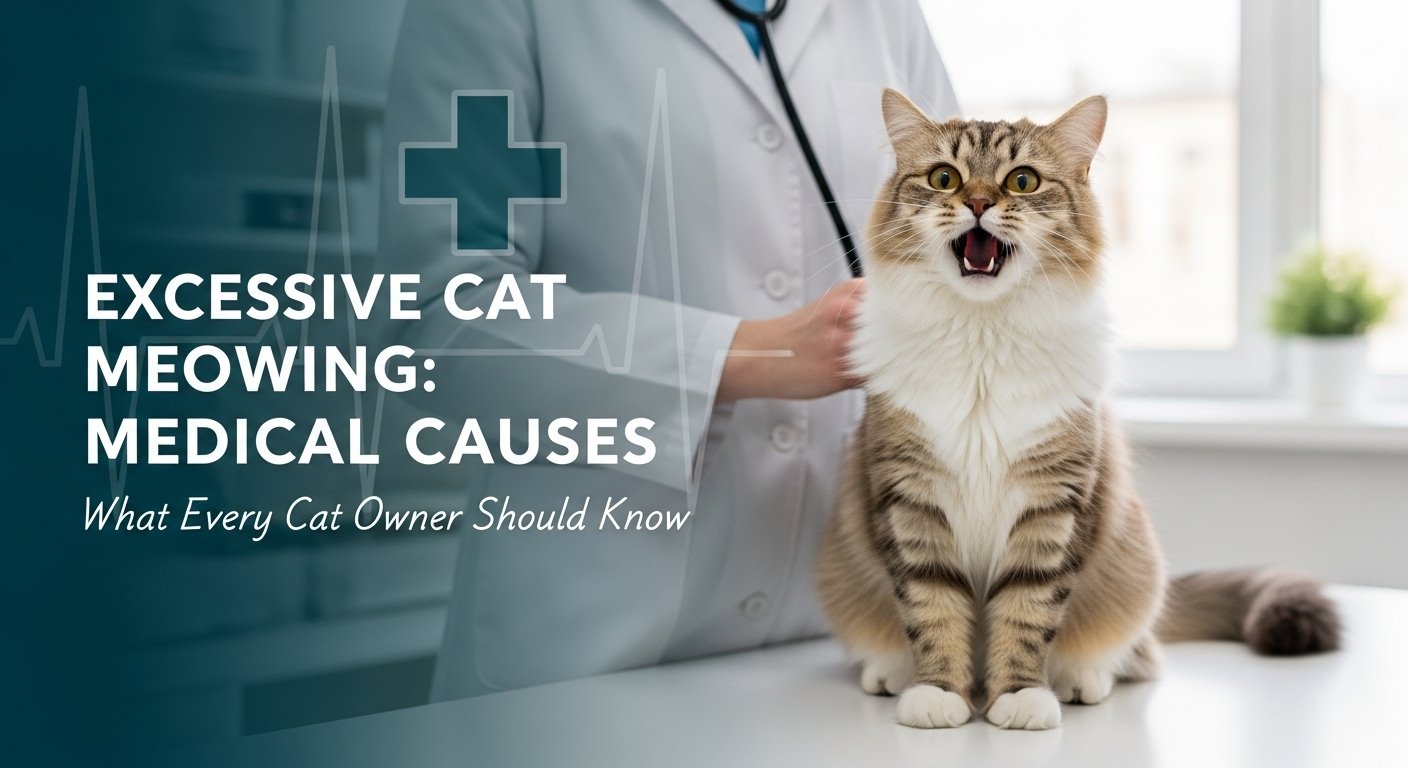
Medical Reasons Your Cat Might Meow Excessively at Night
It’s the middle of the night, the house is quiet, and suddenly your cat starts meowing loudly, repeatedly, and sometimes for hours. While some nighttime vocalization in cats is normal (especially in kittens or attention-seeking adults), excessive meowing can signal underlying medical issues.
Understanding the medical reasons behind nighttime crying can help you get the right care for your feline friend and restore peace to your household.
Normal vs Excessive Night time Meowing
- Normal: Short bursts of meowing before meals, during play, or occasional calls.
- Excessive: Persistent, loud, or unusual meowing that disrupts sleep or appears out of character for your cat.
When the pattern suddenly changes especially in adult or senior cats it often indicates a health-related problem.
1. Hyperthyroidism
One of the most common causes of excessive vocalization in middle-aged and senior cats is hyperthyroidism.
Symptoms:
- Loud, frequent meowing (often at night)
- Increased appetite but weight loss
- Hyperactivity or restlessness
- Vomiting or diarrhea
- Excessive drinking and urination
Why It Causes Meowing:
An overactive thyroid gland speeds up metabolism, leaving cats restless and unable to settle. Nighttime becomes especially difficult, leading to yowling or constant crying.
What to Do:
A blood test at your vet confirms the condition. Treatment options include:
- Daily medication (methimazole)
- Radioactive iodine therapy
- Surgery
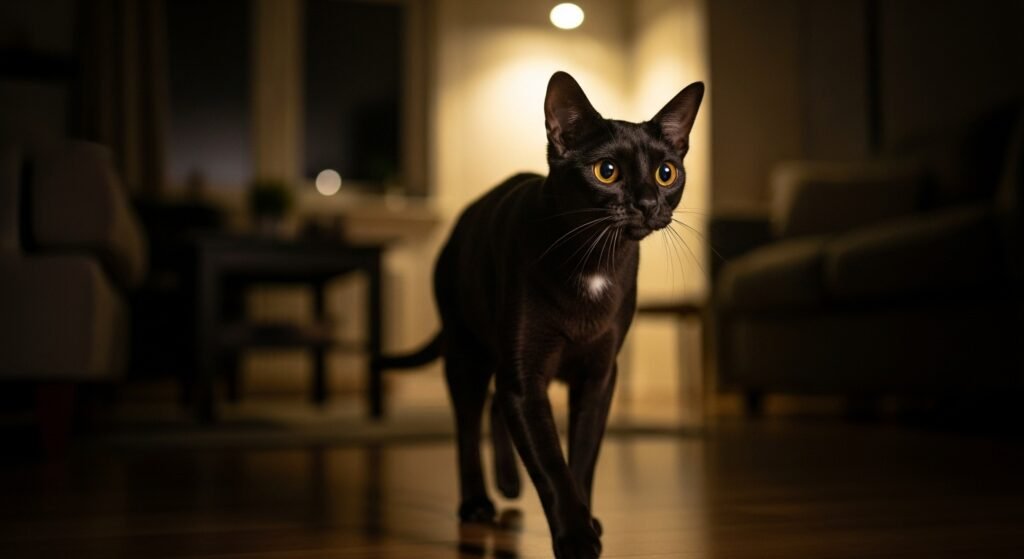
2. Cognitive Dysfunction (Feline Dementia)
As cats age, some develop cognitive dysfunction syndrome (CDS), similar to Alzheimer’s in humans.
Symptoms:
- Nighttime confusion and disorientation
- Loud meowing or yowling (“night calling”)
- Wandering aimlessly
- Forgetting litter box habits
- Changes in sleep-wake cycles
Why It Causes Meowing:
Disorientation makes senior cats feel lost, especially in the dark. They cry out for reassurance or because they don’t understand where they are.
What to Do:
- Provide nightlights to reduce confusion
- Keep routines consistent
- Use calming pheromones (like Feliway)
- Consult your vet about supplements or medications for cognitive support
3. Pain or Discomfort
Cats are masters at hiding pain, but vocalization especially at night can be a sign something hurts.
Common Causes of Pain in Cats:
- Arthritis: Joint pain makes it hard to rest comfortably.
- Dental Disease: Toothaches or mouth pain trigger restlessness.
- Injuries or Illnesses: Even small injuries may cause distress at night.
What to Do:
- Schedule a physical exam
- Watch for other pain signs (limping, reluctance to jump, hiding)
- Ask your vet about pain management options
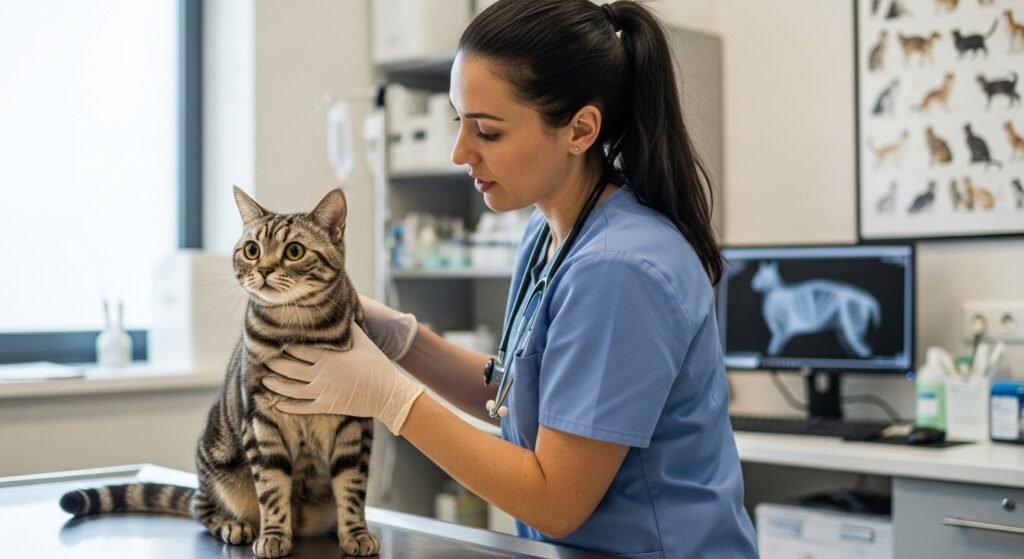
4. Kidney Disease
Chronic kidney disease is common in older cats and often linked with excessive meowing.
Symptoms:
- Nighttime restlessness and crying
- Increased thirst and urination
- Weight loss and poor coat condition
- Nausea or vomiting
Why It Causes Meowing:
Toxin buildup in the blood can make cats feel unwell, restless, or nauseous, leading to increased vocalization especially at night.
What to Do:
- Bloodwork and urinalysis confirm kidney function
- Special diets and medications help manage the disease
- Ensure constant access to fresh water
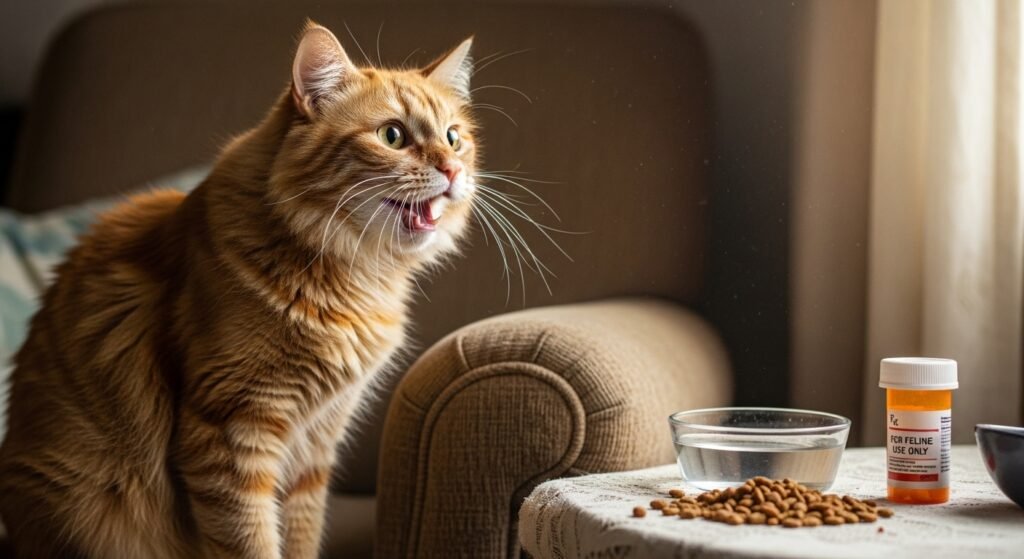
5. Hypertension (High Blood Pressure)
High blood pressure in cats often accompanies kidney disease or hyperthyroidism, but it can also exist on its own.
Symptoms:
- Sudden, loud nighttime yowling
- Disorientation or vision problems
- Pupil dilation
- Restlessness
Why It Causes Meowing:
Hypertension can cause headaches, disorientation, or even blindness all of which contribute to stress-related meowing.
What to Do:
- Regular blood pressure checks at the vet
- Prescription medication (amlodipine is commonly used)
6. Neurological Conditions
Brain disorders, tumors, or seizures can alter a cat’s behavior, sometimes leading to excessive meowing.
Symptoms:
- Unusual vocalizations
- Circling or pacing
- Sudden personality changes
- Seizure-like activity
These cases are less common but require urgent veterinary attention.
7. Vision or Hearing Loss
Cats experiencing sensory decline may meow more at night due to:
- Difficulty navigating in the dark
- Startling more easily
- Seeking reassurance from owners
Providing extra lighting, consistency, and gentle reassurance can help.
8. Other Medical Conditions
Other issues that may cause night crying include:
- Urinary tract infections (UTIs): Painful urination may trigger vocalization.
- Heart disease: Causes discomfort and restlessness.
- Diabetes: Increased hunger, thirst, and nighttime restlessness
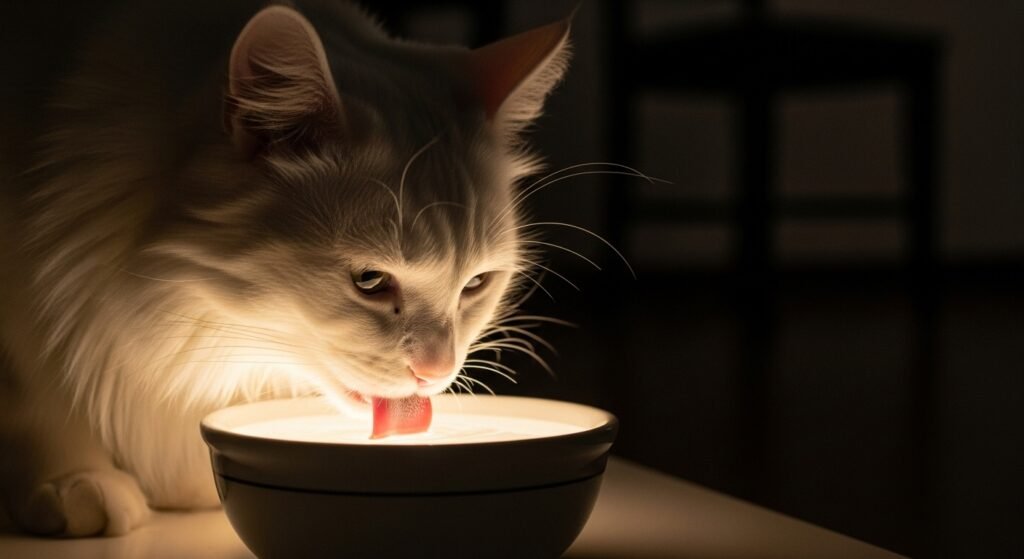
When to See a Vet
If your cat suddenly starts meowing excessively at night, schedule a vet visit if you notice:
- Rapid weight changes
- Excessive thirst or urination
- New confusion or disorientation
- Persistent vomiting or diarrhea
- Increased aggression or clinginess
Early diagnosis is key to many medical causes of night meowing can be managed with treatment.
Tips to Support Your Cat at Night
- Keep a consistent routine for feeding, play, and bedtime.
- Provide enrichment during the day to reduce nighttime restlessness.
- Use pheromone diffusers for stress relief.
- Discuss calming supplements with your vet (e.g., L-theanine or melatonin).
- Offer a cozy sleeping area close to you for comfort.
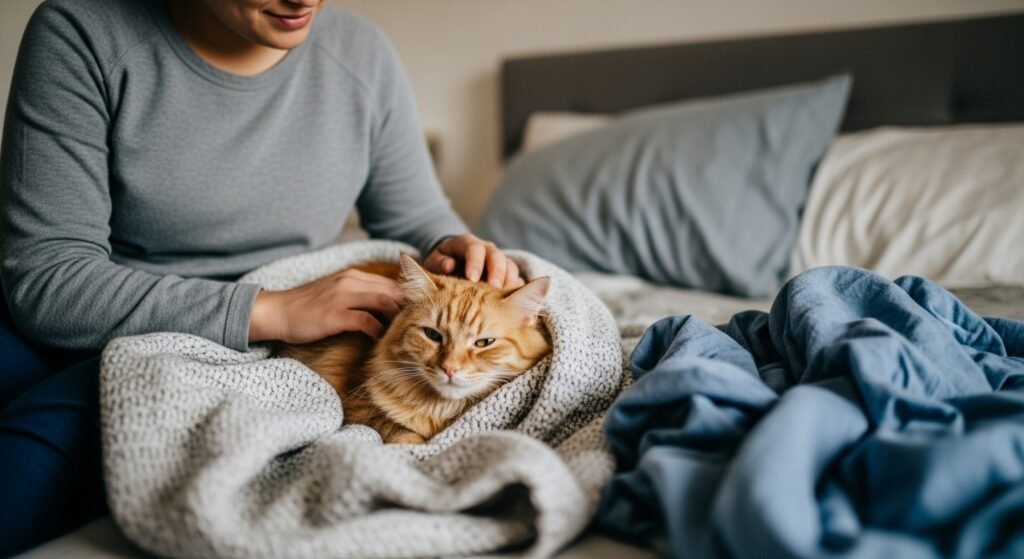
Mistakes Owners Make
- Assuming it’s “just behavior” – when it could be medical.
- Punishing the cat for meowing – this increases anxiety.
- Ignoring gradual changes – many illnesses start subtly.
- Delaying a vet visit – early intervention makes a huge difference.
Final Thoughts
Cats meowing at night isn’t always about attention or play it can be a red flag for underlying health problems. From hyperthyroidism and kidney disease to pain or cognitive decline, medical issues are often at the root of nighttime vocalizations.
The best step you can take is to observe your cat closely, note changes, and seek veterinary care promptly. With the right diagnosis and treatment, your cat can feel more comfortable and you can finally get some sleep.
Remember: a meow is a message. When it comes at night and happens often, your cat may be asking for help.



